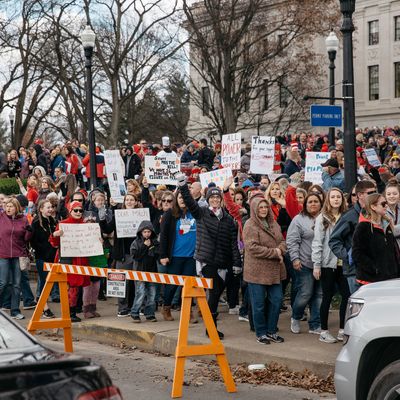
West Virginia’s teachers, bus drivers, and school cooks will soon be a bit less underpaid. By mounting a wildcat strike that shuttered the Mountain State’s school system for nine days, West Virginia teachers forced Republican elected officials to provide them, and their colleagues in the public education system, with a 5 percent raise.
This is no small victory. Public sector unions enjoy few rights in West Virginia, and count few friends in its state legislature. The success of their strike is a testament to the power of labor solidarity, and the weakness of public support for the conservative movement’s vision of government. These teachers suspended their state’s entire school system for over a week, imposing a significant burden on West Virginia parents — and still, public support for the teacher’s demands remained high enough to force conservative Republicans to reward an act of labor militarism.
That public support shouldn’t be too surprising. Only two states in the union pay their teachers lower salaries than West Virginia did. And two of the state’s neighbors, Pennsylvania and Maryland, pay their teachers nearly $20,000 more each year than the average West Virginia educator makes. These realities have left the Mountain State with an estimated 720 unfilled teaching positions. Last year, then-Democratic West Virginia governor Jim Justice tried to ameliorate this crisis, proposing $450 million in new taxes to fund a raise for the state’s teachers, among other initiatives. Republicans in the state legislature refused to sign on.
West Virginia voters may have fondness for right-wing rhetoric, social conservatism, and Donald Trump. But very few of them would prefer for their children to attend overcrowded classes taught by underqualified teachers, than for rich people and corporations to pay higher taxes. On the national level, the GOP has been able to conceal the costs of its addiction to regressive tax cuts through deficit financing. But on the state level, the books need to balance, And so, voters must (eventually) grapple with the actual trade-offs of “small government” — bigger McMansions for the elite, failing public schools for the rabble. The depth of public support for the striking teachers in West Virginia suggests that, even in the heart of Trump country, Americans prefer investment in public goods to upward redistribution. This development should give courage to progressives and public-sector unions in other deep red states, where GOP orthodoxy is making it impossible for governments to fulfill their most basic obligations to ordinary citizens.
But while the West Virginia strikers victory is significant, it’s also partial. The teachers won their raise, but they did not convince their elected officials to put public education ahead of coal companies’ profit margins — rather, they forced Republicans to put the former ahead of Medicaid recipients. The legislature did not consent to a single penny of tax increases. Instead, it will fund the teachers’ raises with $20 million in spending cuts, including reductions in public spending on health care — this, in a state that suffering the brunt of a drug overdose epidemic.
The strikers won the battle in West Virginia. But there’s an awful lot of class war yet to be waged.






























